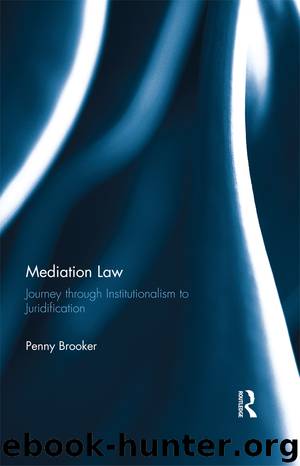Mediation Law by Penny Brooker

Author:Penny Brooker
Language: eng
Format: epub
Publisher: Routledge
Delay and timing of mediation
The Halsey guidelines give weight to whether participating in mediation would unnecessarily delay a court hearing, which is relevant to whether a refusal has been reasonable, although Mackie et al. observe that there are advantages to engaging in the process even at a late stage as it can save court costs if issues are narrowed.267 A number of court decisions have deliberated on the ‘appropriate’ timing for mediation, which comes down to ‘balancing’ whether the parties have enough information about the dispute in order to mediate effectively or whether it is reasonable for a party to wait until there is sufficient disclosure of evidence to respond to the claims against them. The pre-action protocols drive the litigation process through the exchange of pleadings, discovery of evidence and witness statements and entangle the timing of mediation within this framework.
There are a number of problems attached to delaying mediation until after the parties have fully engaged in the pre-action protocols and case management process. First, the protocols require litigants to consider or explore settlement but the expense of complying with the protocols can become a major obstacle hampering settlement because of the frontloading of costs.268 Second, there is evidence from the cases that when lawyers or their clients find themselves in ‘costs difficulties’ sometimes strategic ADR or mediation offers are made.269 Additionally, although Halsey confirms that the costs of mediating may be recoverable, the position of ‘pre-action mediation’ is less certain, which may influence when parties mediate.270 The issue of delaying mediation is also frustrated because there are ‘financially diminishing returns’ the later in litigation that it takes place, although some parties prefer mediating once legal action has started because the process offers ‘benefits’ such as ‘testing witnesses or evidence or narrowing issues’. Waiting to mediate may not present the best opportunity for a mediated settlement.271
The High Court gave an analysis about the timing of mediation in Sixth Duke of Westminster v. Raytheon when ordering a stay for mediation to take place in the USA after a claimant brought an action for ‘negligent maintenance’ of a Cessna plane in the English jurisdiction and proceedings against Cessna in Kansas for ‘faulty design’.272 Judge Wax in the Kansas court ordered mediation and asked the High Court if the defendants could be ordered to the same mediation.273 Gross J first observed that the English courts can ‘facilitate and encourage’ mediation but not mandate attendance – although consideration can be given in costs if a party refuses a mediation offer.274 The court provided three reasons for encouraging the parties to mediate: First, there were no grounds to believe that because mediation had been mandated in the USA that Cessna would not ‘participate responsibly and constructively’.275 Second, the claimant was ‘on the face of it the innocent party’ which made it desirable to bring all the parties together.276 Finally, Gross J noted that mediating later in litigation might enable a clearer understanding although it would increase costs of the dispute; but there was a ‘trade off’ between saving costs in an early mediation or participating with more information.
Download
This site does not store any files on its server. We only index and link to content provided by other sites. Please contact the content providers to delete copyright contents if any and email us, we'll remove relevant links or contents immediately.
International Integration of the Brazilian Economy by Elias C. Grivoyannis(57383)
The Art of Coaching by Elena Aguilar(50095)
Flexible Working by Dale Gemma;(22952)
How to Stop Living Paycheck to Paycheck by Avery Breyer(19218)
The Acquirer's Multiple: How the Billionaire Contrarians of Deep Value Beat the Market by Tobias Carlisle(11680)
The Radium Girls by Kate Moore(10915)
Thinking, Fast and Slow by Kahneman Daniel(10618)
The Art of Thinking Clearly by Rolf Dobelli(8862)
Hit Refresh by Satya Nadella(8344)
The Compound Effect by Darren Hardy(7574)
Atomic Habits: Tiny Changes, Remarkable Results by James Clear(7229)
Turbulence by E. J. Noyes(7055)
Tools of Titans by Timothy Ferriss(6964)
How to Be a Bawse: A Guide to Conquering Life by Lilly Singh(6700)
Change Your Questions, Change Your Life by Marilee Adams(6654)
Nudge - Improving Decisions about Health, Wealth, and Happiness by Thaler Sunstein(6642)
Win Bigly by Scott Adams(6327)
The Black Swan by Nassim Nicholas Taleb(6202)
A Court of Wings and Ruin by Sarah J. Maas(6108)
